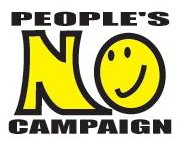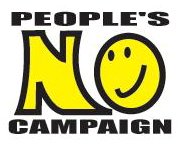- British Presidency of EU Begins...so does the Propaganda Offensive
Listed below is the Government's version of 'What has the EU ever done for us?'
Brief commentary appeared in the Newcastle Journal this morining and can be read here.
______________________________________________________________
North East
Membership of the EU is vital for the economy in the North East:
- In 2000 a report by South Bank University found that 142,000 jobs in the North East depended on exports to the EU.1
- The European Union is the North East’s most important export market. In 2003, 62% of goods exports from the North East went to countries in the EU countries, bringing £5 billion a year into the region’s economy.2
- During 2003 an average of 420 companies exported from the North East to the EU each month.3 These include Trident UK, based in Gateshead, which specialises in the manufacture of dinghies, sailingwear and trailers, and which won new orders worth several thousand pounds after participating on a trade mission to Amsterdam.4
- Tourism is one of the region’s biggest industries and over 44% of tourists who visited Northumbria in 2002 came from the EU countries.5
- The North East region has benefited from 63 inward investments decisions in 2003/4 creating 1919 new jobs, of which 26 were from European companies creating 1291 new jobs. Some examples of European companies investing in 2003/4 in the North East were Saft from France who expanded its workforce in its hi-tech battery system for industrial applications manufacturing plant at South Shields, and Getinge AB from Sweden, which expanded its manufacturing of operating theatre equipment in Sunderland.6
Membership of the EU has brought many cultural and environmental benefits for the North East:
- Gateshead has Strategic Cultural Partnerships with Gdansk in Poland, Gothenburg in Sweden and Tallinn in Estonia, as well as Bergen in Norway. These partnerships will strengthen of the region's links around the North Sea, with the Scandinavian and the Baltic and Central and Eastern European states in the European Union. The link with Tallinn has resulted in a teacher exchange with Tallinn focusing on ICT in the curriculum, and an Estonian Boys' choir visiting and performing in Gateshead. The Tyne Tallinn Film Challenge 2003 - involved exchanges of North East and Tallinn film makers, and workshops with young people (Ryton Comprehensive School who made a film).7
- Since its inception in 1992, Northern Stage Ensemble has been committed to the forging international collaborations from its home base at Newcastle Playhouse. Earlier this year the company’s production Homage to Catalonia, a stage adaptation of Orwell’s novel, was performed in Leeds, Newcastle, Paris and Barcelona. In autumn 2005, after an £8m rebuild and refurbishment, Newcastle Playhouse will reopen as a European Centre for Performing Arts. 8
- Seven beaches in the North East have blue flag status. Four of these are in North Tyneside - Cullercoats, Whitley Bay, Tynemouth and King Edward's Bay which was highlighted as the best in the country. To achieve the EU’s prestigious Blue Flag status means meeting strict European standards for water quality, litter collection and public amenities.9
- Many players from other EU countries have contributed their skills and talents to North East’s football clubs. These players include Newcastle’s Patrick Kluivert (Netherlands) and Middlesbrough player Szilard Nemeth (Slovakia).
- 411 students from institutions in the North East of England took part in Erasmus exchanges in 2003/2004. Robert Hough from the University of Northumbria at Newcastle studying for a BA in International Business Management went to Universidad Antonio de Nebrja – Universitas Nebrissensis in Spain for a year and included in that was a 4 month industrial placement. He received 2350 euros towards his study period abroad.10
The passenger terminal at the Port of Tyne handles regular ferry services to Northern Europe and Scandinavia, with in excess of 820,000 passengers per year.11- Easyjet fly from Newcastle to Barcelona, Belfast, Berlin, Budapest, Copenhagen, Geneva, Malaga, Nice, Palma, Paris, Prague and Rome. The region also has ferry connections to Gothenburg and Amsterdam.12
The North East benefits from millions of pounds of European Funding every year13:
- The North East will receive over £650 million of EU funds from 2000 to 2006.
European funding goes to a variety of projects and organisations, and is broken down into three categories14:
- Business support
- Large scale strategic sites of employment
- Community development
So far, the North East has supported over 1,500 projects. Here’s just a flavour15:
£1.2 million to develop England’s first national centre for the Children’s Book. (Funding awarded October 2003 - Objective 2)
MEPs representing the North East in the European Parliament:
Mr Stephen Hughes (Labour)
Mr Martin Callanan (Conservative)
Mrs Fiona Hall (Liberal)
Local European celebrities [will be approached to secure involvement with the campaign]
- Thomas Zehermair, artistic director, Northern Sinfonia (Austria)
- Sirkka-Lisa Kontinnen, photographer (Finland)
- Mart Poom, footballer (Estonia)
- Szilard Nemeth, Middlesbrough FC (Slovakia)
For more info: http://www.go-ne.gov.uk/ __________________________________________________________________
1:UK jobs dependent on the EU, Brian Ardy, Iain Begg and Dermot Hudson, European Institute, South Bank University.
2:HM Customs and Excise, Quarter 1, 2004 Press Release, ‘UK Regional Trade in Goods Statistics’
3:HM Customs and Excise, Quarter 1, 2004 Press Release, ‘UK Regional Trade in Goods Statistics’
4:UKTI
5:Star UK, 2001 Tourism Facts.
6:Information held by UK Trade and Investment, Inward Investment Group
7:Information held by Gateshead City Council
8:Northern Stage - Mo Lovatt, Programming & Planning Co-ordinator, 0191 245 0014
9:http://www.seasideawards.org.uk/
10:Information held by UK Erasmus Council
12:Information held by the European Programmes Team, Government Office for the North East
13:Information held by the European Programmes Team, Government Office for the North East
14:Information held by the European Programmes Team, Government Office for the North East
15:Information held by the European Programmes Team, Government Office for the North East




